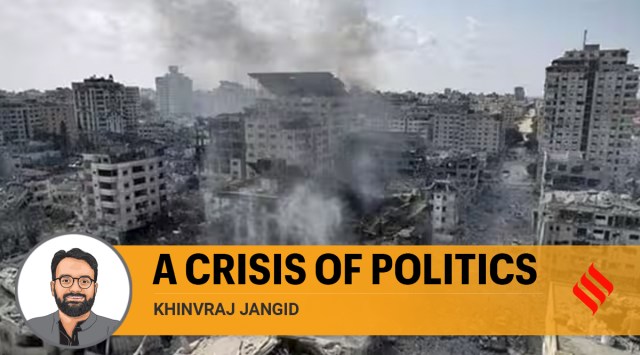Israel’s people are going through a crisis — and they do not trust their leaders to deal with it
Hamas managed the attack despite Israel’s army being known as one of the best in the world. Politics, human folly, is the spoiler
 Israel's army fought militants in residential areas for five days.
Israel's army fought militants in residential areas for five days. Israel is dealing with the worst attack on its people since the days of the Holocaust. More than 1,300 have died, most of whom are ordinary people caught unawares in their homes and kibbutzim all over south Israel. The elderly and teenagers, women and men, woke up to rocket sirens. That is a familiar part of life for Israelis. What has not been experienced before is armed militants of Hamas and Palestinian Islamic Jihad surrounding their homes. The militants (calling them terrorists is also correct in this instance) were jubilant, making reels and videos of the captives they took with them into Gaza.
There is no count of how many have been abducted. Dead bodies of Israeli soldiers were taken to be used as leverage against Israel. Foreign agricultural workers from the Philippines, Thailand and Mexico have also been captured. Ten Nepalese citizens and 12 Thai citizens were killed, as per the statements of their embassies here.
Israel’s army fought militants in residential areas for five days. The infiltration was massive, as 1,500 dead bodies of militants were counted from southern Israel. Hundreds of Israeli families have been asking about their loved ones’ whereabouts, and some have information about them being captured, with the help of videos coming out of Gaza.
Israelis are enduring pain and agony and will have to bear more in days to come. Hundreds are missing, and dead bodies are to be found in the vast desert of Negev, identified and buried. In all this, the army has called all its reserve force to report for a massive land and air operation over Gaza. There is no time for mourning, or to sit for seven days of Shiva, as Jews do for their dead.
I have worked at the Ben-Gurion University’s campus of Sde Boker Kibbutz for the last two years. Located deep in the Negev desert, this place somehow escaped the worst, but many small and big communities and villages next to it have been under attack. A day later, I was supposed to be at the annual conference of the European Association of Israel Studies there with more than 200 participants who travelled to Israel last week from all over the world.
Journalists who called me for a first-hand account had one common question: How did such a thing happen to the state of Israel — an army-state known for its intelligence, interceptors and heavy security protocols?
Simply put, the current government ignored all warnings given by the defence minister, Yoav Gallant, in the last seven months. Since January this year, the far-right government of Benjamin Netanyahu has been pushing for radical judicial reforms to get unlimited political power for religious and nationalist objectives such as more settlements in the West Bank, exempting the ultra-orthodox population from conscription, giving more budgetary benefits for religious organisations than for liberal-secular ones.
Days earlier, on the eve of Yom Kippur, the big issue within Israeli society was whether to have religious ceremonies with gender segregation in public places. Democratic, strong, yet non-violent mass movements for the last eight months have been fighting on this agenda. The defence minister publicly opposed the politics that was dividing the nation. The PM fired his defence minister for calling for a pause of the judicial reforms in March. The heads of Mossad and Shabak, Israel’s internal intelligence agency, and many senior army officers made the PM withdraw that sacking order. Netanyahu and Gallant have not been on the same page since.
Thousands of soldiers, pilots and intelligence experts refused to volunteer in the last six months. Gallant kept saying that the socio-political divisions have impacted the army’s war or operational preparedness. He saw the army’s human power depleting. Some of the ministers in the government ridiculed the Chief of Staff, Herzl Halevi, for his public reports that Israel’s national security was becoming vulnerable due to political divisions. They accused the army of harbouring plans of a coup, not supporting the government on judicial reforms and overstating security concerns. The Times of Israel reported that Netanyahu shouted at the army chiefs for speaking publicly about national security issues and weakening deterrence about two months ago. “It seems the army is running the country”, he reportedly said, to the chiefs who were asking for an immediate halt to the judicial reforms.
Efraim Halevy, former director of Mossad, appointed by Netanyahu when he became the prime minister in 1998, has been critical of him for “losing touch with reality”. Halevy joined the protest movement, like many other ex-directors of Mossad, because he found the government was ignoring the inner divisions that could harm the army’s strength and unity. Halevy thought the current political crisis in Israel “is not one of those ordinary events you just move on from, but a major act of destruction that could wreck the entire edifice of the state”. It is shocking, yet possible, that all-powerful leaders can conflate their interest with the national interest. Strong leaders are delusional, they can risk the lives of their people with their trickery. Israelis are getting united behind the army; they may not trust their leaders again.
At a deeper level, the politics of Netanyahu derailed the Oslo Peace Process and pushed Israeli politics more into unilateralism for the last two decades. He created a make-believe world where Israel could live and prosper with conflict management rather than find a resolution with the Palestinians. The Palestinian leadership after Yasser Arafat and Hamas’s use of terror are equally responsible for non-resolution of the conflict.
Israel’s army is fighting a war that it constantly worried about and warned the political leaders against. Israel’s political leaders found them inconvenient reports at best and pushed them aside. The Israeli people are going through an acute crisis even though their army is known as one of the best in the world, and their intelligence tools and sophisticated warfare means are sought after by other countries. Politics, human folly, is the spoiler.
The writer is director, Jindal Centre for Israel Studies, Jindal School of International Affairs, O P Jindal Global University


- 01
- 02
- 03
- 04
- 05




























